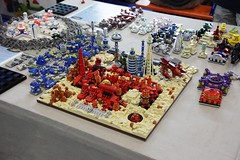Anglų - Lietuvių žodynas
Kompiuterinis žodynas internete nemokamai
Germany
Germany tarimas:
/'ʤɜ:rməni /
Germany audio:
Žodžio paaiškinimas anglų kalba:
- : A country of north-central Europe. Occupied since c. 500 B.C. by Germanic tribes, the region became part of the Frankish empire by the sixth century A.D. Later it became a loose federation of principalities and the nucleus of the Holy Roman Empire until the imperial state was broken up by Napoleon in 1806. Germany became a confederation after 1815 and then an empire centered around Prussia (1871-1918). Following its defeat in World War I, it was reorganized as the Weimar Republic, which collapsed when Adolf Hitler rose to power and formed the Third Reich. Germany's defeat in 1945 at the end of World War II resulted in its division into four occupation zones, each controlled by an Allied power. Out of the U.S., French, and British zones
West Germany was established in 1949, while the Soviet zone became East Germany. The two Germanies were reunified in 1990 after the fall of the East German Communist government. Berlin is the capital and largest city. Population: 82,400,000.
Lietuviškos reikšmės:
- Vokietija viskas gerai
Germany
www.alkonas.lt/zodzio/germany/vertimas
apostle of germany
www.alkonas.lt/zodzio/apostle-of-germany/vertimas
east germany
www.alkonas.lt/zodzio/east-germany/vertimas
nazi germany
www.alkonas.lt/zodzio/nazi-germany/vertimas
west germany
www.alkonas.lt/zodzio/west-germany/vertimas
federal republic of germany
www.alkonas.lt/zodzio/federal-republic-of-germany/vertimas
Žodyno testas
Ką reiškia lietuviškai?
Parinkite teisingą atsakymą
absolve
/əb'zɔlv/

